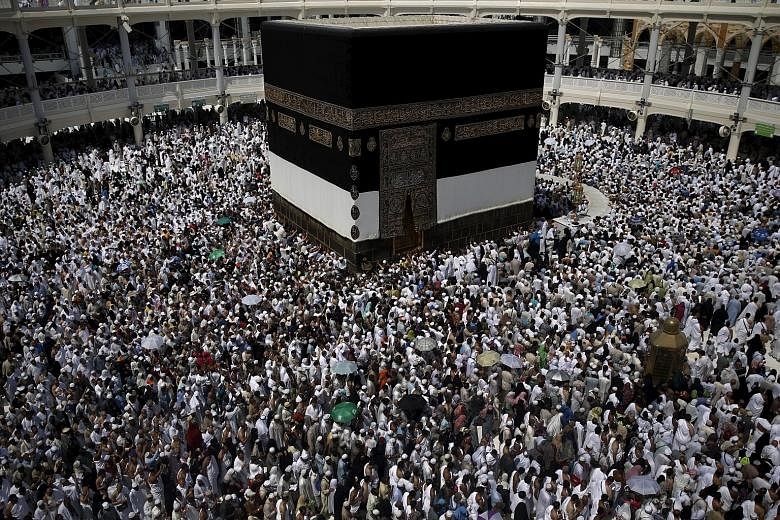MECCA, Saudi Arabia (AFP) - Two million white-clad Muslims from across the globe began the haj pilgrimage in western Saudi Arabia on Tuesday, in one of the world's largest annual gatherings.
A sandstorm blew and light rain fell around the vast plain known as Mount Arafat, where the faithful began to arrive ahead of the climax of haj on Wednesday.
Many reached Arafat by bus but some walked from the holy city of Mecca about 15km away, after circumambulating the holy Kaaba, a black cube-shaped structure toward which Muslims pray worldwide.
Police manned checkpoints along the way to verify the permits of pilgrims.
Most of the throng would pass the evening in the tent city of Mina before moving in the early hours of Wednesday to the rocky hill where they believe the Prophet Muhammad gave his final sermon 14 centuries ago after leading his followers on the haj.
For many, the haj will be the highlight of their spiritual lives.
This year's gathering is about the same size as last year's, with 1.4 million foreign pilgrims joining hundreds of thousands of Saudis and residents of the kingdom.
They are undeterred by a crane collapse at Mecca's Grand Mosque earlier this month that killed 109 people and injured nearly 400 at Islam's holiest site.
A construction crane working on an expansion of the Grand Mosque collapsed during severe winds, killing Saudis, Iranians, Nigerians, Malaysians, Indonesians and Indians, among others.
Previously marred by stampedes and fires that killed hundreds, the pilgrimage had been largely incident-free for the past nine years after safety improvements.
Joyous pilgrims like 35-year-old Egyptian Walaa Ali had been gathering for days ahead of the haj.
"It is a gift from God that He has chosen us to come here," Ali said with tears in her eyes, as preachers nearby explained the history and rituals of the haj to men and women sitting side by side.
"I am so happy to be here," she said in Mecca.
The haj is among the five pillars of Islam and every capable Muslim must perform the pilgrimage at least once in his or her life.
100,000 POLICE
This year's gathering takes place against a backdrop of increased militant violence in some Muslim countries, a surge of the potentially deadly Mers virus, and the war in Saudi Arabia's neighbour Yemen.
About 100,000 police have been deployed to secure pilgrimage sites and manage the crowds.
Authorities say they are on alert for possible attacks by extremists.
The militant Islamic State in Iraq and Syria (ISIS) group has carried out bombings targeting security forces and Shi'ite mosques in the kingdom in recent months.
Security forces have taken "measures to prevent terrorist groups from exploiting haj season to carry out acts of sabotage," interior ministry spokesman General Mansur al-Turki said.
This year's haj also comes with Saudi Arabia at war.
Since March, the kingdom has led an Arab coalition conducting air strikes and supporting local forces in Yemen against Iran-backed rebels.
Most Yemeni pilgrims performing the haj this year already reside in the kingdom.
Among other challenges facing Saudi authorities is potential transmission of the deadly Middle East Respiratory Syndrome coronavirus (Mers-CoV).
The capital Riyadh saw a jump in infections last month, but health officials say there has never been a case of Mers infection among pilgrims.
Saudi Arabia is the country worst affected by Mers, with 532 deaths since the virus appeared in 2012.
The health ministry has mobilised thousands of health workers to help ensure a virus-free pilgrimage and to care for routine ailments.
The first day of the haj is known as Tarwiah Day, when pilgrims traditionally watered their animals and stocked water for their trip to Mount Arafat.
On the way, modern-day pilgrims stay in specially-built fireproof tents during their stop in Mina, a city which only comes alive during haj season.
At Mount Arafat they will pray and recite from the Koran.
Pilgrims start the haj by entering ihram, a state of purity in which they must not quarrel, wear perfume, cut their nails, or trim their hair or beards.
During ihram, men wear a seamless two-piece shroud-like white garment, while women must wear loose dresses, generally also white, exposing only their faces and hands.
The clothing emphasises their unity, regardless of whether they spend the haj season in Mecca's five-star hotels or shabby high-rise hostels.

